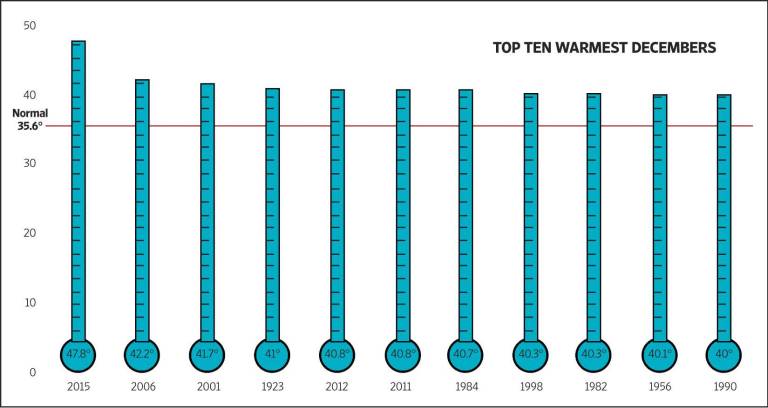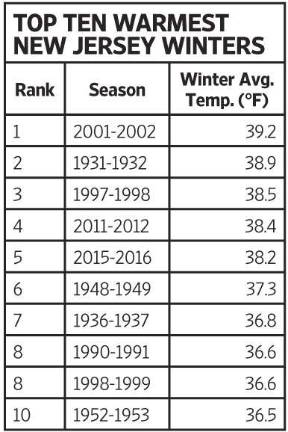The pros and cons of a warm winter


BY ERIKA NORTON
SPARTA — The state of New Jersey experienced the fifth-warmest winter on record this year, which had its pros and cons.
According to Sparta Department of Public Works Director James Zepp, there were 25 snow/ice events by March 31 of last year. As of March 21 of this year, there have been only 13 snow/ice events.
“It was definitely a milder winter compared to last year,” Zepp said.
December 2015 was the warmest December on record in New Jersey, with a monthly statewide average temperature of 47.8 degrees, breaking the old record by 5.6 degrees, according to New Jersey State Climatologist David A. Robinson. And with an average temperature of 38.2 degrees, the 2015-2016 winter (December, January, and February) is now the fifth-warmest New Jersey winter.
To date, Zepp said the DPW has used only one-third of the amount of salt and grit used last year. As to how much money was saved on snow removal, he said that Sparta won’t have that information until the calendar year is up, but whenever there is a surplus of money budgeted for handling snow, that money is transferred into the township's “snow trust” account.
The trust can be dipped into when current snow budgets are used up, or in the event of emergencies or natural disasters, Zepp explained. Although 2015 was a hard winter, the township still ended up with a surplus of snow monies.
“The storm only grazed Sussex County, leaving this normally snowiest portion of the state with the lowest season-to-date totals, with some locations barely over 12 inches,” Robinson wrote in a winter report.
As Zepp noted, DPW plow and salt truck operators get paid for hours worked, so if there’s less snow, there’s less pay. He said that those workers have union contracts, so these terms are spelled out in their agreements.
Unfortunately, the uncertainty of Mother Nature is part of the deal.
“They earned more money last year because they worked a lot more than they did this year,” Zepp said.
On the flip side, according to Byram Department of Public Works Superintendent Adolf Steyh, when Byram DPW workers are called to go out and plow, it counts as overtime. He said most of his guys were happy to not have to go out and work.
“Last year, I know in February, we had about 10 major storms, so this year I think we had two,” Steyh said. “So yes, we saved a lot in the overtime category, plus wear and tear on the trucks.”
The ski resort released a statement on March 14, saying, “We thank all of you for your support and positivity during a tough winter. Mother Nature is an incredible force to be reckoned with, and she had the upper hand when it comes to snowfall and cold temps … Remember that we will try as hard as possible to keep winter alive, even when Mother Nature doesn’t.”
Although the winter was warmer, Mountain Creek was still able to hold many of their leading winter events, including Red Bull All Snow, K2 Pretty in Pink, Twisted Kids and the Special Olympic Games. The resort was also a part of the World’s Largest Ski and Snowboard Lesson on Jan. 8, with more attendance than at any other mountain in the country, according to Mountain Creek.
They also are able to address potholes and berm repair earlier. Plus, the warmer weather has allowed Zepp to get other things done without having to fight frigid weather.
“I was able to do some projects around town,” Zepp said. “In my own building, I’m able to organize things that I normally don’t have time to do. Just clean up the shop, take care of the trucks a little better, equipment-wise. That’s always nice, instead of having to go out and fight the snow all the time.”
The Byram DPW has also gotten a jump on spring projects due to the warmer weather. For example, the department already started working on the township’s fields towards the end of February, according to Steyh.
“We've started working on our catch basins already, which we don’t normally do until at least April, but we’re probably two to three weeks ahead on that,” he said. “Our street sweeping, which we normally don’t do until the beginning or middle of April. We’re three-quarters of the way done with cleaning our streets already, too."